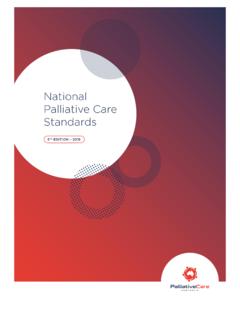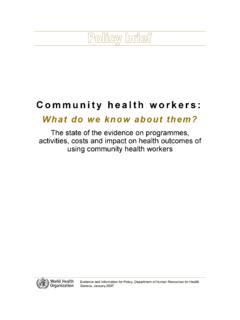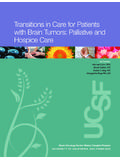Transcription of A Review of Palliative Care Competence …
1 A Review of Palliative care Competence Frameworks Prepared for The Palliative care Competency Framework Development Project Steering Group A Review of Palliative care Competence Frameworks, May 2012. Prepared by Dr Michael Connolly, Ms Karen Charnley & Dr Joan Regan, AIIHPC. CONTENTS. Summary 3. Background 4. Competence Framework Development 5. Competence Frameworks from Various Jurisdictions (Table) 7. Summary of Key Competence Frameworks (shaded in Table) 16. 1. Interdisciplinary Palliative care Competence Frameworks 16. 2. Palliative care Competence Frameworks for Medicine 20. 3. Palliative care Competence Frameworks for Nurses and Health and Social care Workers 22. 4. Palliative care Competence Frameworks for Social Work 29. Review Group Recommendations 30. References 32.
2 References for Competence Frameworks 32. Appendices 36. Appendix 1 Generic Tuning Competences 37. Appendix 2 Medicine Specific Tuning Competences 39. Appendix 3 Nursing Specific Tuning Competences 44. Appendix 4 Tuning Sectoral Framework for Social Sciences 47. Appendix 5 Correspondence of levels established between national qualifications frameworks and the EQF 51. Appendix 6 Varying compatibility of higher education frameworks for Scotland (FQHEIS/SCQF), for England, Wales & Northern Ireland (FHEQ) and for the Republic of Ireland (NFQ IE) within the FQ-EHEA (the Bologna Framework) 52. 2. Summary The Health Service Executive (HSE) Palliative care Programme Briefing Document (2012). identified the development of a Palliative care Competence Framework as a key objective for the coming year.
3 The framework will support managers, teams and individuals in identifying appropriate Palliative care competences for use within their organisation or workplace. The Health Service Executive's Palliative care Programme convened a Project Steering Group to support, guide and oversee the development of the Palliative care competency framework. The steering group comprises members from the Health Service Executive (HSE), All Ireland Institute of Hospice and Palliative care (AIIHPC), the Irish Association for Palliative care (IAPC) and the Irish Hospice Foundation (IHF). The purpose of this project is to develop a Palliative care Competency Framework for healthcare professionals working in various healthcare settings. The framework will provide for core competences in Palliative care whilst also detailing individual competences for each health and social care discipline.
4 This framework will inform academic curricula and professional development programs, and so will enhance the care of people with life limiting illness, fostering greater inter-professional and inter-organizational collaboration in Palliative care provision. At the first meeting of the Project Steering Group (April 25th 2012), AIIHPC agreed to undertake a Review of available international Palliative care Competence frameworks. The purpose of the Review was to consider frameworks already in use in other jurisdictions in order to make an appropriate and informed recommendation to the Project Steering Group. A number of Palliative care Competence frameworks from the UK, US, Canada, Australia and Northern Ireland were reviewed and summarised. All frameworks reviewed identified domains of Competence with specific indicators for each.
5 Many of the frameworks reviewed failed to indicate how the framework could inform curriculum development or support continued professional development and life-long learning in the clinical environment. There was a lack of any reference to Tuning Competences in frameworks reviewed from other European states. The Palliative care Competency Framework should reflect a move to standardisation of undergraduate and postgraduate education in Europe and how this relates to the development of Competence through Tuning Competences. Tuning Competences provide a guide for attainment of knowledge, skills and attributes for practice in the health and social care professions. Tuning competences would be used in the context of developing a clear framework for evidence-based, safe and effective Palliative care for generalist and specialist practitioners irrespective of place of practice.
6 In conclusion we recommend that the Palliative care Competence Framework should be developed in line with Tuning Competences, which provide flexibility and autonomy to develop both core and discipline specific competences for generalist and special Palliative . 3. Background In 1999 the Bologna Declaration was signed and became the primary document used by signatory countries to establish a general framework for modernisation and reform of European higher education. A number of objectives were identified as key to establish the European area of higher education in order to: Adopt a system of easily readable and comparable degrees to increase employability of European citizens Adopt a system based on two cycles undergraduate and postgraduate Establish a system of credits European Credit Transfer System (ECTS) where credits would not only be accrued through academic awards but also through experiential learning Promote mobility for students, teachers, researchers Promote European co-operation in quality assurance Promote European dimensions in higher education, with particular regard to curricular development, inter-institutional co-operation and the integration of study, training and research.
7 In order to provide a concrete approach to implement the Bologna Process, a university driven project entitled Tuning Educational Structures was developed. The Tuning approach consists of a methodology to design or redesign, develop, implement and evaluate programmes of study for both undergraduate and postgraduate education cycles. The Tuning process has been validated through testing across several continents (Gonzalez &. Wagenaar 2007). Tuning can also serve as a platform to develop reference points at subject level in order to make programmes of studies comparable, compatible and transparent (Gonzalez &. Wagenaar 2007). The reference points are expressed as learning outcomes and competences. Learning outcomes are statements of what it is a learner is expected to know and understand and be able to demonstrate once a learning event has taken place.
8 Learning outcomes tend to specify the requirements needed to obtain an award. Tuning advises that learning outcomes be expressed in terms of level of Competence that is to be obtained by the learner. Competences represent a dynamic combination of knowledge, skills abilities and ethical values. All educational programmes should foster the development of competences recognising that some competences are generic while others may be subject-area related (specific to a field of study) or indeed discipline specific. Tuning distinguishes three types of generic competences: Instrumental competences demonstrated by cognitive, methodological, technological and linguistic abilities 4. Interpersonal competences demonstrated social skills and abilities to interact and co- operate Systematic competences demonstrated abilities and skills to show understanding, sensibility and knowledge; and to demonstrate the use of acquired instrumental and interpersonal competences Tuning Competences allow flexibility and autonomy in the construction of curricula, underpinned by a common language used to describe what curricula are trying to achieve.
9 So too Tuning Competences are useful in the context of developing a clear framework for evidence-based, safe and effective Palliative care for generalist and specialist practitioners irrespective of place of practice. Competence Framework Development Competence assessment has evolved and been influenced by the learning taxonomy devised by Bloom (1984). Competence development takes into account the incremental nature of knowledge attainment for skills based on experience and education. It also provides a basis for the development of clinical knowledge and career progression in health and social care . In a number of jurisdictions the development of Competence frameworks has been influenced by the publication of a number of key documents: The NHS Cancer Plan (2000) determined a strategic direction development of a national, high quality, uniform and equitable cancer service' (Becker, 2007:14).
10 The RCN Core Competency Framework (2003) attempted to bring together a uniform framework for cancer nursing across four levels of practitioner and a wide variety of skills The Canadian Hospice Palliative care Nursing Standards of Practice (2009) defined the standard of care that can be expected by all persons receiving HPC nursing and looked to guide, support and promote the provision of further education and training The National Association for Social Workers Standards for Palliative & End of Life care (2004) (US) - standards were designed to enhance social workers' awareness of the skills, knowledge, values, methods and sensitivities needed to work effectively with clients, families, health care providers, and the community when working in end of life situations The Royal Australian College of General Practitioners Curriculum for Australian General Practice (2011) (Australia) Palliative care Sets out the training outcome of 5.



